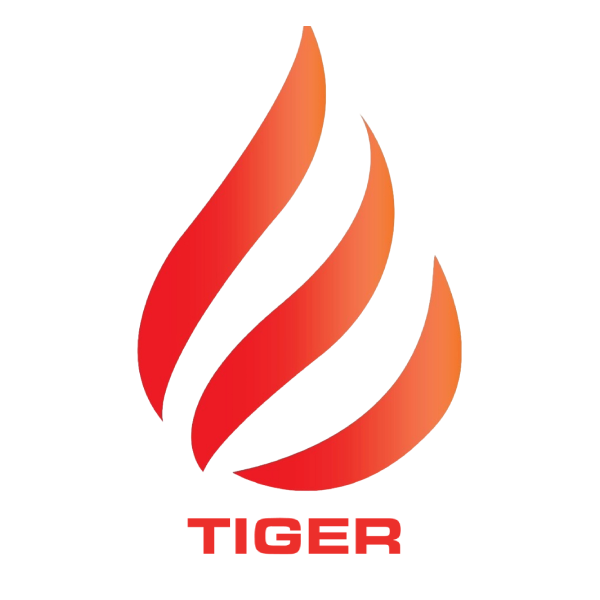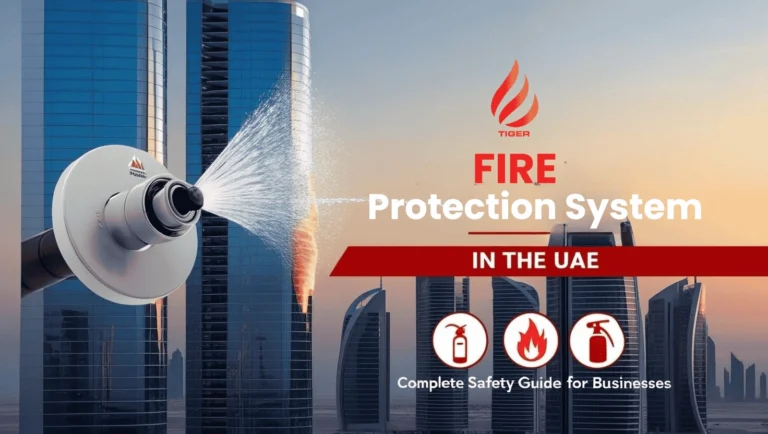Types of Fire Protection Systems in UAE
Fire Detection and Alarm Systems
A fire alarm system is the backbone of any fire safety strategy. In the UAE, businesses must install Civil Defence-approved systems that include:
- Smoke Detectors (Ionization, Photoelectric, or Aspiration)
- Heat Detectors (Fixed Temperature or Rate-of-Rise)
- Manual Call Points (Emergency break-glass units)
- Addressable vs. Conventional Alarms (Addressable systems provide precise fire
location, ideal for large facilities)
Fire Suppression Systems
Fire suppression systems go beyond detection and alerting—they actively extinguish fires. The types of fire suppression systems commonly used in the UAE are:
Water-Based Fire Sprinkler Systems:
- Wet Pipe Systems: These systems are always filled with water and are best suited for buildings like offices and hotels where freezing conditions are not a concern.
- Dry Pipe Systems: Typically used in environments where freezing temperatures are a concern, such as warehouses, these systems hold air under pressure until a fire is detected.
- Deluge Systems: These systems release a large volume of water over a specific area and are ideal for high-hazard environments like power plants and chemical plants.
Gas-Based Suppression Systems:
- FM-200 & Novec 1230: These are clean agents commonly used in sensitive areas like server rooms and data centers where water-based suppression would damage equipment.
- CO2 Systems: Effective in suppressing fires, especially in industrial settings, but requires evacuation due to the potential health hazards of CO2 exposure.
Foam & Chemical Suppression:
- AFFF Foam: Suitable for aviation and oil industries, these foam-based systems are excellent for suppressing fuel fires.
- Dry Chemical Systems: These are used in environments like industrial kitchens and factories, where a fast, effective response is required to extinguish fires caused by flammable liquids and gases.
Fire Extinguishers & Emergency Equipment
Portable fire extinguishers are a vital component of fire safety in the UAE. They provide immediate means to fight small fires before they escalate. Types include:
- Class A (Solids) – Extinguishers using water or foam, effective on fires involving solid combustibles like wood, paper, or plastics.
- Class B (Liquids) – Extinguishers using CO2 or dry powder, ideal for liquid fires like oil or gasoline.
- Class C (Gases) – Dry chemical extinguishers used to combat fires involving electrical equipment and gases.
- Class F (Cooking Oils) – Wet chemical extinguishers specifically designed for kitchen fires caused by cooking oils and fats.
UAE Fire Safety Regulations & Compliance
UAE fire safety regulations are strictly enforced by the Civil Defence to ensure the safety of people and properties. Businesses must comply with these regulations to avoid penalties and ensure operational continuity.
Civil Defence Fire Safety Laws
Under Federal Law No. 20 of 1991 and the UAE Fire and Life Safety Code (FLSC), businesses are required to adhere to several important safety practices, including:
- Fire Risk Assessment: A comprehensive assessment must be conducted to identify fire hazards, assess the risk level, and develop fire safety measures.
- Approved Fire Protection Systems: All systems must be certified and compliant with national and international standards like NFPA or BS.
- Regular Fire Drills & Staff Training: Businesses must conduct fire drills at least twice a year to ensure staff are trained to respond effectively during a fire emergency.
- No-Objection Certificate (NOC): Before occupancy, businesses need to obtain an NOC from the Civil Defence to confirm compliance with fire safety regulations.
Penalties for Non-Compliance
Non-compliance with fire safety regulations can lead to severe consequences, including:
- Fines: Businesses may be fined up to AED 50,000 for failing to comply with fire safety standards.
- Business Closure: If safety standards are ignored or violations occur, businesses may face temporary or permanent closure.
- Legal Liability: In the event of a fire-related injury or fatality, businesses may be held legally liable for negligence.
Industry-Specific Requirements
Different industries have specific fire safety requirements, including:
- Hotels & High-Rises: These buildings must have advanced sprinkler and smoke control systems, as well as emergency exit systems designed for high-occupancy buildings.
- Oil & Gas Facilities: These facilities require explosion-proof suppression systems due to the high risk of hazardous material fires.
- Data Centers: Gas-based fire suppression systems, such as FM-200, are ideal for protecting sensitive equipment from fire damage.
Choosing the Right Fire Protection System for Your Business
Selecting the right fire protection system for your business involves understanding your specific needs, conducting a fire risk assessment, and selecting an experienced supplier.
Conducting a Fire Risk Assessment
Before installing any fire protection system, a comprehensive fire risk assessment is crucial. This assessment should identify potential fire hazards and assess the risks associated with various factors, including:
- Potential Fire Hazards: Common hazards may include electrical faults, flammable materials, or poorly maintained equipment.
- High-Risk Zones: Certain areas, such as kitchens, server rooms, and storage areas, require more robust fire protection measures.
- Evacuation Challenges: High-occupancy buildings or facilities with complex layouts may require additional exits, emergency lighting, and effective evacuation plans.
Selecting a Certified Fire Protection Supplier
It’s important to select a certified fire protection supplier to ensure that the installed systems meet UAE standards. Look for suppliers who:
- Provide Civil Defence-approved products and installations.
- Have experience in your industry (such as healthcare, manufacturing, or hospitality).
- Offer 24/7 emergency support and maintenance services to handle any unexpected issues or breakdowns.
Installation & Maintenance Best Practices
Proper installation and regular maintenance are crucial for ensuring the efficiency of fire protection systems. Best practices include:
- Professional Installation: Always hire a certified contractor to install fire protection systems. DIY setups can result in non-compliant systems that fail during inspections.
- Monthly Checks: Regularly test alarms, inspect fire extinguishers, and check for any signs of system malfunction.
- Annual System Testing: A complete inspection of the suppression systems should be done yearly to ensure proper functionality.
- Staff Training: Ensure your employees are trained on how to operate fire extinguishers and know the emergency evacuation routes.
Conclusion
Investing in fire protection systems in the UAE is not optional—it is both a legal and ethical responsibility. Ensuring compliance with fire safety regulations, coupled with the installation of reliable fire detection and suppression systems, helps protect lives and minimize damage. By adopting proactive measures such as regular maintenance, staff training, and integrating modern technology, businesses can stay ahead of fire risks and safeguard their operations.
Need Expert Help?
If you’re uncertain about the most suitable fire protection system for your business or need help with compliance, reach out to a certified UAE fire safety provider. Ensure you stay compliant and safeguard your employees and assets.

